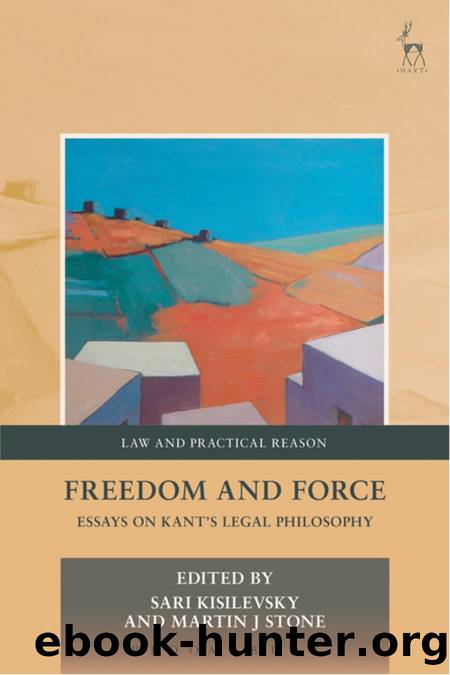Freedom and Force by Sari Kisilevsky;Martin J Stone;

Author:Sari Kisilevsky;Martin J Stone;
Language: eng
Format: epub
ISBN: 9781782253075
Publisher: Bloomsbury UK
Published: 2019-11-24T00:00:00+00:00
II.RATIONAL DETERMINATION AND AN OPEN QUESTION
Let me begin with a puzzle: suppose the law states that I ought to do X. It seems to me a legitimate questionâat least within Kantâs practical philosophyâto ask whether I am actually obligated to do X, and this for at least two interrelated reasons: first, because the addressees of all normative prescriptions are persons (there is, as it were, no simpler unit of agency in the Kantian universe); second, to the extent to which normative prescriptions are directed at persons, it seems natural to suppose that for anything to count as an obligation it has to be something that we can square with the story Kant tells us about how agents are obligated simpliciter. This is the story of the moral law: nothing (incentives, brute facts or social institutions) that purports to obligate can do so unless it figures as a normative reason before the deliberating agent.2 Moreover, to figure as such a reason, it will need to be reflectively endorsed as âa maxim through which the agent can at the same time will that it should become a universal lawâ.3 Assuming the correctness of this picture, we can state our initial puzzle as follows: it is conceivable that for any social fact4 that purports to obligate an agent A, it will remain an open question whether it also succeeds in grounding an obligation for A.5 In other words, each time the agent is addressed by normative utterance <NU>: âYou ought to do X!â, there is nothing in that fact alone to rule out the question: âAm I obligated to do X?â For, under the Kantian conception of agency, the question about the obligatory force of <NU> is antecedent to any facts of pedigree outside the reflective test of agency. Let us label this âthe open question of obligationâ.
As for open questions, the main problem is one of determination (or the lack of it). Until we can lock on to something that can generate a determinate answer, the question will hang over us and so will its troubling effects. The problem ramifies, for it presents itself not just in connection with the Kantian account but also with any other account that takes agency itself to be validating of whatever may count as a reason for action (obligations being the most central cases of that class of reasons).6 In contemporary legal theory, Mark Greenberg has proposed to tackle the indeterminacy implied by the open question through the rational determination condition (RDC).7
According to the RDC, in order for any social facts to determine the content of the relevant legal norms, more than a relation of supervenience is requiredâall that supervenience can deliver is metaphysical determination, or the condition that the facts of a particular legal practice (LP) determine factually a legal norm (LN) across possible worlds. More is required, however, in order to establish the normative relevance of social facts to the content of any legal norm. Rational determination captures this requirement in pointing to normative
Download
This site does not store any files on its server. We only index and link to content provided by other sites. Please contact the content providers to delete copyright contents if any and email us, we'll remove relevant links or contents immediately.
Killers of the Flower Moon by David Grann(3240)
Machine Learning at Scale with H2O by Gregory Keys | David Whiting(2292)
Will by Will Smith(2042)
Guns, Germs and Steel by Diamond Jared(1884)
Borders by unknow(1785)
The Room Where It Happened by John Bolton;(1721)
The Color of Law by Richard Rothstein(1575)
Once Upon a Broken Heart by Stephanie Garber(1485)
Water Rights and the Environment in the United States by John Burch(1414)
Friends, Lovers, and the Big Terrible Thing by Matthew Perry(1328)
Examples & Explanations: Administrative Law by William F. Funk & Richard H. Seamon(1326)
A Short History of War by Jeremy Black(1300)
HBR's 10 Must Reads 2022 by Harvard Business Review(1256)
Pharmacy Practice and The Law by Richard Abood(1254)
The Strength In Our Scars by Bianca Sparacino(1248)
That Every Man Be Armed by Stephen P. Halbrook(1237)
The Guarded Gate by Daniel Okrent(1220)
515945210 by Unknown(1208)
Injustices by Ian Millhiser(1199)
